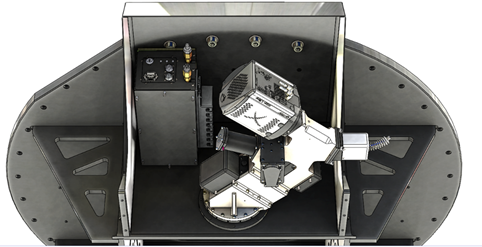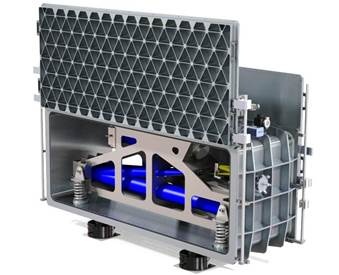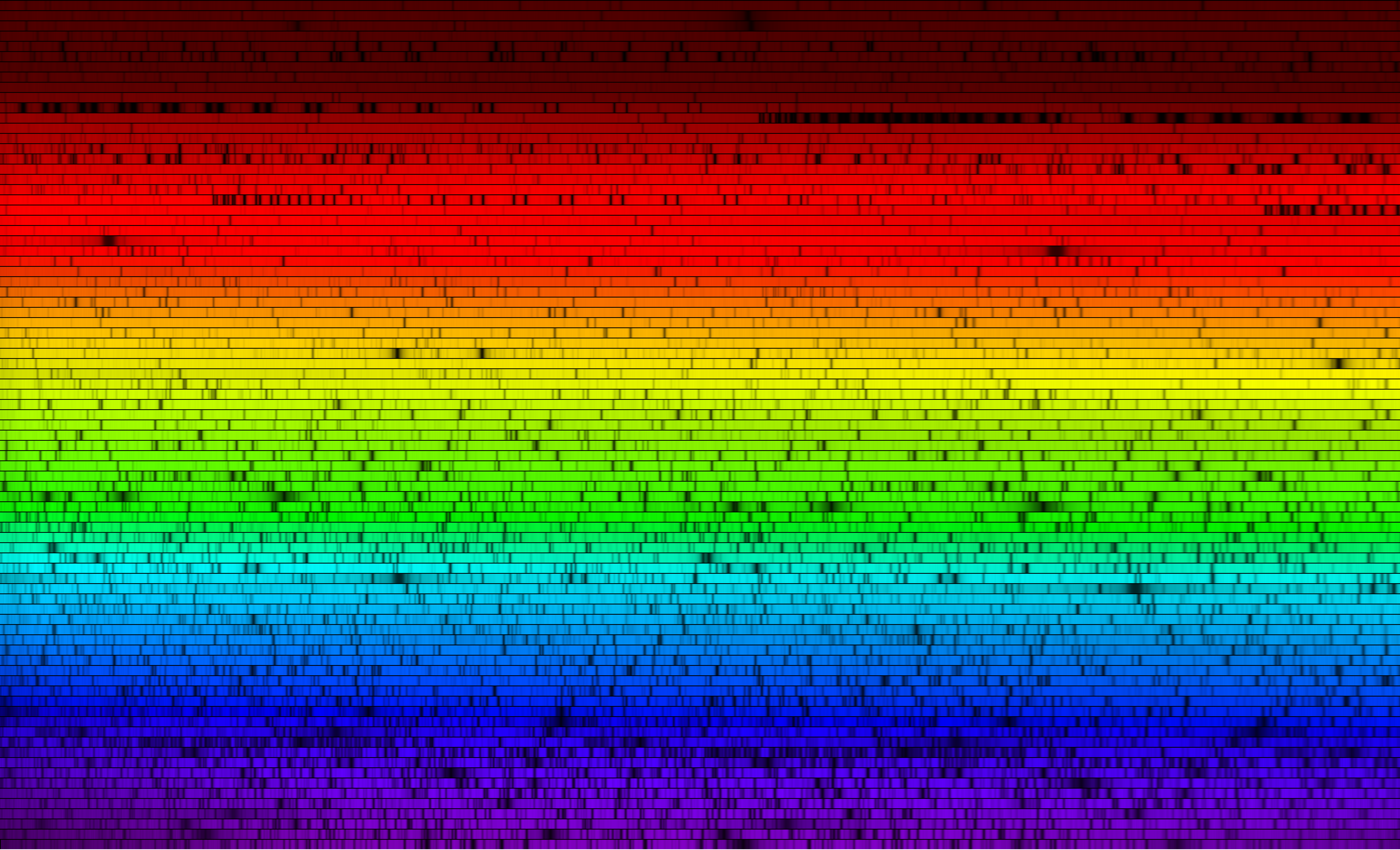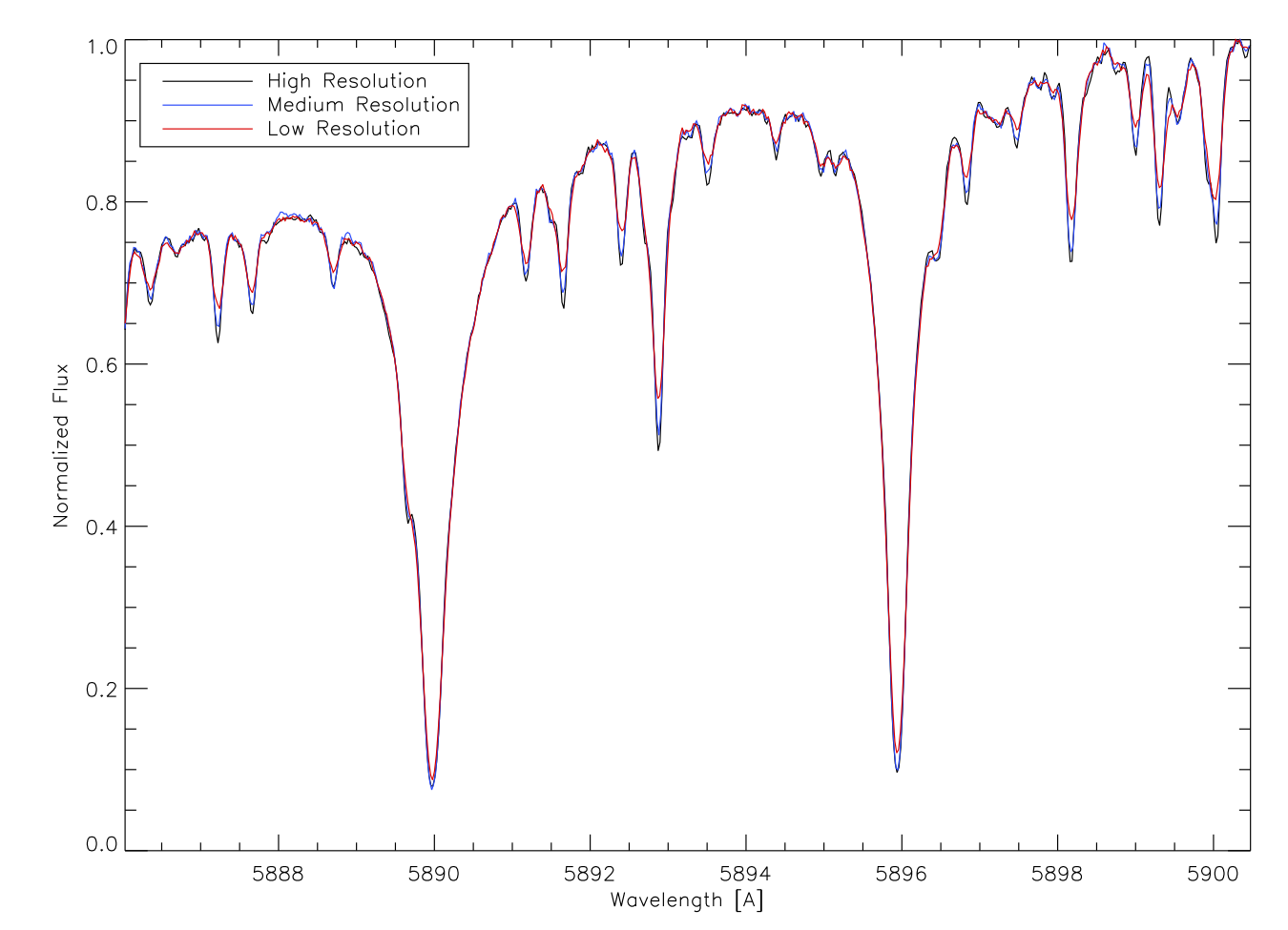- Created by Timothy Ellsworth-Bowers, last modified by Stephen Levine on Dec 05, 2025
Facility Instruments: Visitor / PI Instruments: High-Res Spectrograph (EXPRES) User Manuals:

The EXPRES front-end module mounted on the DCT Cassegrain instrument cube. The FEM electronics are mounted within the instrument port cavity as seen in the upper left corner.

The EXPRES spectrograph structure. The outer vacuum enclosure maintains the spectrograph in a vacuum at better than 0.01 mBar, and using radiation shields and insulation maintains the temperature to better than 1 mK. The optics support structure visible inside the chamber maintains precise alignment of the optics and is mounted on a suspension to isolate it from mechanical vibrations. Removable panels allow easy access to the spectrograph for maintenance.

The white pupil design has three resolution modes: R = 30000, 45000, 60000 and we obtained the first light solar spectrum (5-second exposure) by running an optical fiber down the hall and holding it out the window! The image above shows the extracted 2-d spectrum and the plot on the one below shows the sodium doublet in all 3 resolution modes.

Visitor Instrument – Available Full-Time, Remote Available – CONTACT J.M. Brewer or D. FISCHER IF YOU WISH TO USE
Mounting Port: Instrument Cube – Port B (small)
Manual: EXPRES Quick Start Guide / Checklist (v. 2025Dec05)
Additional Information:
- EXPRES Webpage (Yale)
An overview of the instrument can be found in Jurgenson et al. 2016, Proc SPIE, 9908, 99086T
Blackman, Ryan T., et al., 2020, AJ, 159, 238, Performance Verification of the EXtreme PREcision Spectrograph
Petersburg, Ryan R., et al., 2020, AJ, 159, 187, An Extreme-precision Radial-velocity Pipeline: First Radial Velocities from EXPRES
- Brewer, J. M., et al., 2020, AJ, 160, 67 (8pp), EXPRES. I. HD 3651 as an Ideal RV Benchmark
Instrument Scientist: Debra Fischer (debra.fischer at yale dot edu)
The EXtreme PREcision Spectrometer (EXPRES) has been built by Debra Fischer's group at Yale. It consists of a front end module (FEM) mounted on the instrument cube for sending star light down a fiber to the larger environmentally controlled Back End Module (BEM) that contains a high resolution spectrometer. The goal is 10 cm/sec precision for radial velocity measurements. The FEM arrived at LDT for testing beginning in late 2017Q2. The BEM is located in the ground floor instrument lab and was installed in late 2017Q4 with commissioning following during 2018A. At this time, EXPRES is fully operational. So that the partnership can begin to learn about the capabilities of EXPRES, anyone interested in using EXPRES should contact the EXPRES PI to discuss what they hope to do, and what can be supported.
Tutorials:
- For the video tutorials, confluence playback is functional but limited. You may want to download the file and use your favorite video display tool. These have been tested with VLC and QuickTime.
- EXPRES observing script tutorial. (mp4 container w/ h.264 video and AAC audio)
Instrument Quick Facts:
Publications related to the Instrument:
Instrumentation and Software Pipelines:
Llama, J., et al. 2024, "The Lowell Observatory Solar Telescope: a fiber feed into the Extreme Precision Spectrometer" SPIE13094E..2OL, eprint arXiv
Zhao, L.L., et al. 2021, "Excalibur: A Nonparametric, Hierarchical Wavelength Calibration Method for a Precision Spectrograph" AJ 161..80
Holzer, P.H., et al. 2020, "A Hermite-Gaussian Based Radial Velocity Estimation Method" arXiv20524083
Blackman, R. T., et al. 2020, "Performance Verification of the EXtreme PREcision Spectrograph" AJ 159..238
Petersburg, R.R., et al. 2020, "An Extreme-precision Radial-velocity Pipeline: First Radial Velocities from EXPRES" AJ 159..187
Brewer, J.M., et al. 2020, "EXPRES. I. HD3651 as an Ideal RV Benchmark" AJ 160..67
Xu, X., et al. 2019, "Modeling the Echelle Spectra Continuum with Alpha Shapes and Local Regression Fitting" AJ 157..243
Leet, C., Fischer, D. A., Valenti, J.A. 2019, "Toward a Self-calibrating, Empirical, Light-weight Model for Tellurics in High-Resolution Spectra" AJ 157..187
Blackman, R. T., et al. 2019, "The Measured Impact of Chromatic Atmospheric Effects on Barycentric Corrections: Results from the EXtreme PREcision Spectrograph" AJ 158..40
Petersburg, R. R., et al. 2019, "Modal Noise Mitigation through Fiber Agitation for Fiber-fed Radial Velocity Spectrographs" ApJ 853..181
Blackman, R.T., et al. 2017, "Accounting for Chromatic Atmospheric Effects on Barycentric Corrections" ApJ 837..18
Jurgenson, C., et al. 2016, "EXPRES: a next generation RV spectrograph in the search for earth-like worlds" SPIE.9908E..6T, eprint arXiv:1606.04413
Stellar Activity and RVs:
Zhao, L.L., et al. 2024, "The Extreme Stellar-signals Project. III. Combining Solar Data from HARPS, HARPS-N, EXPRES, and NEID" AJ 166..173 4
Zhao, L.L., et al. 2022, "The EXPRES Stellar Signals Project II. State of the Field in Disentangling Photospheric Velocities" AJ 163..171
Roettenbacher, R. M., et al. 2022, "EXPRES. III. Revealing the Stellar Activity Radial Velocity Signature of Epsilon Eridani with Photometry and Interferometry" AJ 163..19
Holzer, P.H., et al. 2021, "A Stellar activity F-statistic for Exoplanet Surveys (SAFE)" AJ 161..272
Cabot, S.H.C., et al. 2021 "EXPRES. II. Searching for Planets around Active Stars: A Study of HD 101501" AJ 161..26
Zhao, L.L., et al. 2020, "The EXPRES Stellar-signals Project. I. Description of Data" RNAAS 4..156
Ning, B., et al. 2019, "Identifying Activity-sensitive Spectral Lines: A Bayesian Variable Selection Approach" AJ 158..210
Davis, A., Cisewski, J., Dumusque, X., Fischer, D.A., Ford, E. 2017, "Insights on the Spectral Signatures of Stellar Activity and Planets from PCA" ApJ 846..59
Astrophysics and Exoplanet Detections:
Korolik, M., et al. 2023, "Refining the Stellar Parameters of Tau Ceti: a Pole-on Solar Analog" AJ 166, 3
Brewer, J.M., et al. 2023, "EXPRES. IV. Two Additional Planets Orbiting Rho Coronae Borealis Reveal Uncommon System Architecture" AJ 166..46
Zhao, L.L., et al. 2023 "Measured spin-orbit alignment of ultra-short-period super-Earth 55 Cancri e" NatAstr 7, 198
Cabot , S. H. C., et al. 2021, "TOI-1518b: A Misaligned Ultra-hot Jupiter with Iron in Its Atmosphere" AJ 162..218
Addison, B.C., et al. 2021, "TOI-1431 b/MASCARA-5b: A Highly Irradiated Ultrahot Jupiter Orbiting One of the Hottest and Brightest Known Exoplanet Host Stars" AJ 162..292
Hoeijmakers, H.J., et al. 2020, "High-resolution transmission spectroscopy of MASCARA-2 b with EXPRES" A&A 641..120
- No labels